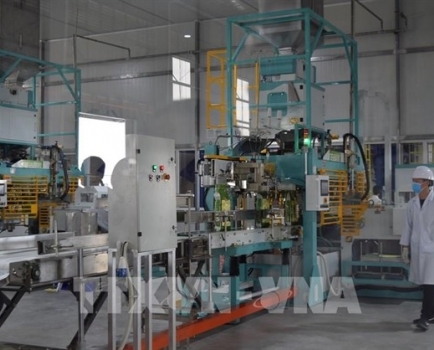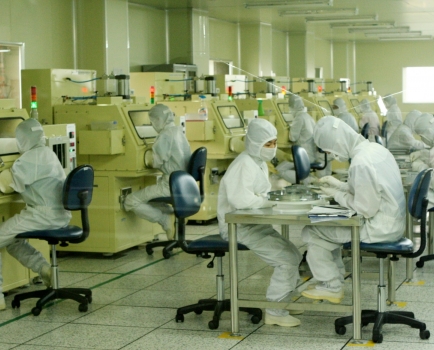Opportunities and pitfalls within private sector development
Fri, 03 May 2019 16:42:00 | Print | Email Share:
VOV.VN - Vietnam is likely to miss the window of huge opportunities to bolster its future development if it is unable to find a way to leverage the contribution of the private sector.

Micro and small - sized enterprises account for some 95 per cent of
the total number of nationwide firms while those operating on medium
scale hold just 1.7 per cent.
Prime Minister Nguyen Xuan Phuc has affirmed that the private sector is crucial to adding momentum to the economy as well as improving its competitiveness and flexibility amidst an ever-changing economic and technological landscape.
The Vietnamese Government is always paying close attention and taking specific actions in order to further the private sector’s development. The country is aiming to have some 1 million enterprises established by 2020, the majority of which will be private firms.
The private sector reportedly contributes a total of 44 per cent to the country’s annual GDP value. Yet its development still falls short of expectations due to a number of factors, most notably a lack of consistent policies.
Economist Tran Dinh Thien, former head of the Vietnam Institute of Economics, notes that the distortion in implementing legal institutions and economic reforms are among the key reasons that hinder proper development of private firms. Furthermore, business operations are largely based around close yet internal relationships.
Nguyen Quang Huan, vice chairman of the Vietnam Private Business Association, emphasized the private sector as a stimulus and one of the three key pillars to the development of the socialist-oriented market economy.
Huan said that Vietnamese enterprises and private ones in particular are enjoying good opportunities to make reforms and innovations that work for their common development.
He added that this year the Government will co-operate with the Party Central Committee’s Economic Commission to carry out a joint inspection of the implementation of guidelines and policies by agencies and localities. These are expected to give a boost for the private sector.
Efforts will occur alongside to perfect legal frameworks and regulations aimed to foster the development of the private sector, he noted.
Agencies and localities have reportedly pledged their best efforts to create favorable conditions in terms of capital and land in order to spur growth within the private sector. These could be seen as policy incentives for private enterprises to go ahead.
The vice chairman suggested that in order to tap into the potential advantages of the private sector, further support is required to help private firms grasp business and investment opportunities, and to improve their overall competitiveness.
Despite this, private firms are facing a number of challenges and complicated developments arising from the ongoing US - China trade tensions. The US have kept interest rates rising with the aim of depreciating the value of Chinese yuan.
This has therefore put an impact on the USD/VND exchange rate while hampering the production and export of many domestic firms. Exchange rate pressures have increased interest rates in VND, thus increasing capital costs for domestic firms, Huan analyzed.
Trade protectionism has been on the rise with increased tariffs on imports, rising requirements in terms of quality, origin of product, and hygiene, whilst import quotas have been slashed. These elements generally pose challenges to local firms’ export and therefore have narrowed their export opportunities, he said.
According to Nguyen Thi Phuong Thao, CEO of Vietjet, the country has received significant contributions from top private firms. On average, the private sector annually provides 1.2 million jobs, resulting in a great contribution to the nation’s GDP growth.
Thao called for consensus in terms of perception and actions among the government, all-level authorities, and agencies with regards to the future development of the private sector.
She underlined the need to quicken the restructuring and equitization of State-owned enterprises and commercial banks, aiming to ease negative impacts on macro-financial stability and growth outlooks.
The Government should improve their mechanisms and policies, as well as set forth measures to accelerate the growth of the private sector, with a view to optimizing the use of private sources to upgrade infrastructure items and making the most of opportunities arising from Industry 4.0.
The businesswoman has high hopes that private firms will receive equal treatment to develop them into spearhead corporations in the field of supporting industries.
Pham Dinh Doan, Chairman of Phu Thai Group, said private firms enjoy limited access to sources, whilst natural resources and other key sources are primarily exploited and used by State-owned enterprises.
There should be a shift in the source exploitation from State-owned companies to private firms. Most notably, many State-owned enterprises are acting on business activities and fields that could yield large profits. In order to create more opportunities for the private sector, fruitful business activities and fields should be transferred to the private sector if they are considered competent, whilst state agencies should only carry out its main task of management.
Micro and small - sized enterprises account for 95 - 96 per cent of the total number of nationwide firms while those operating on medium scale constitute just 1.7 per cent.
Private firms are vulnerable to market developments with 60,000 - 80,000 firms dissolved annually. Last year, the figure reached a peak of more than 90,000.
By: VOV
---------------------------------------------
Same category News :













